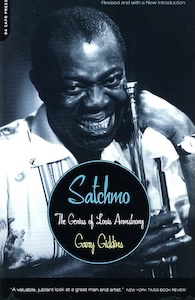
On The Bookshelf
Satchmo: The Genius of Louis Armstrong | Gary Giddins
Gary Giddins has been called “the best jazz writer in America today” by Esquire Magazine. Louis Armstrong has been called the most influential jazz musician of the twentieth century. His magnificent career as trumpeter, singer, bandleader and actor made him a legend in his own time. His influence on jazz and popular music is impossible to overstate. Satchmo is one of the most vivid and insightful portraits ever drawn of the great man and superlative artists in the history of American music.
This edition is an authoritative introduction to Armstrong’s life and art for the curious newcomer and offers fresh insight even for the serious student of the musician. Whether he was known as Pops, Satch,Satchelmouth, Gatemouth, Dippermouth, Louie or King Menelik, this recounting of Louis’s colorful and controversial life brings the man to life.
Satchmo ~ The Genius of Louis Armstrong: 2001 | Gary Giddins
Da Capo Press
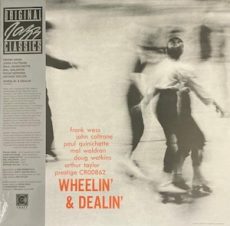
Requisites
Wheelin’ & Dealin’ ~ Frank Wess, John Coltrane, Paul Quinichette, Mal Waldron, Doug Watkins and Arthur Taylor | By Eddie Carter
This morning’s album from the library is an excellent 1957 jam session by Frank Wess, John Coltrane, Paul Quinichette, Mal Waldron, Doug Watkins and Arthur Taylor. Wheelin’ & Dealin’ (Prestige PRLP 7131) is an outstanding album featuring an impressive team of musicians. The ensemble consists of John Coltrane and Paul Quinichette on tenor saxophones, Frank Wess on flute (tracks: A1, B1, B2) and tenor saxophone (track: A2), Mal Waldron on piano, Doug Watkins on bass, and Arthur Taylor on drums. The copy of this album that I own is the 2025 Worldwide Stereo audiophile reissue (Craft Recordings CR00862).
The album opens with Things Ain’t What They Used To Be by Mercer Ellington and Ted Parsons. Frank’s flute sets a welcoming tone for the sextet’s laid-back melody before moving into a relaxing first solo. Paul soars with graceful ease, then John follows him effortlessly with a mellow reading, then the saxophones revisit the sequence. Mal responds with a breezy interpretation, and Doug takes a quick walk, leading to the closing chorus. Wheelin’ by Mal Waldron takes off with the ensemble’s spirited theme. Coltrane leads the way with an energetic statement. Quinichette lets loose next, then Wess wails on the tenor saxophone. Waldron delivers a lengthy, vigorous performance. Taylor adds a brief footnote that leads to the ensemble reprising the theme and a rousing finish.
Side Two opens with Robbins’ Nest by Illinois Jacquet, Bob Russell, and Sir Charles Thompson, a tribute to DJ Fred Robbins. Frank, returning on flute, gently guides the ensemble through the melody, then enters like a cool breeze for the first solo. Paul then offers some down-home cooking; John makes every note count in a relaxed interpretation. Mal then keeps the mood easygoing, and Doug takes a brief walk before the closing ensemble. Mal Waldron’s Dealin’ starts with the sextet’s collective melody; Waldron leads with an inviting opening solo. Wess, on flute, produces a warm, fluid sound. Quinichette steps in for a few relaxing choruses, then Coltrane flows with fresh, creative ideas. Wess makes a short return on tenor sax, and Waldron has the last word before the group reunites to close the set.
The dynamic combination of Coltrane and Quinichette on tenor saxophones infuses the sextet with vibrant energy, establishing an engaging lead voice for the group. Coltrane, poised on the threshold of stardom, plays with deep emotion and a sense of adventurousness, while Quinichette’s silky, relaxed approach pays homage to Lester Young’s signature sound. Frank Wess further elevates the ensemble’s texture, seamlessly alternating between flute and tenor sax; his flute contributions, in particular, bring a light, breezy quality to the arrangements. Supporting them, the rhythm section of Waldron, Watkins, and Taylor lays down a consistent, swinging foundation, artfully mixing delicacy with spirited drive to enhance each soloist’s performance throughout the album.
Bob Weinstock supervised the first session, and Rudy Van Gelder was at the recording console. Kevin Gray did an excellent job mastering this audiophile reissue from the original tapes at Cohearant Audio. The sound quality truly shines, offering a spacious soundstage and vibrant clarity that makes you feel like the musicians are right in front of you. The record is pressed on 180-gram Virgin Vinyl and is silent until the music begins. If you’re craving a fantastic Hard-Bop album, I highly recommend checking out Wheelin’ & Dealin’ by Frank Wess, John Coltrane, Paul Quinichette, Mal Waldron, Doug Watkins, and Arthur Taylor on your next record-shopping trip. It’s an outstanding album by the talented group that later became The Prestige All-Stars, and I believe it will become a beloved favorite in the libraries of both new and seasoned jazz fans for many years to come!
Things Ain’t What They Used To Be – Source: JazzStandards.com © 2025 by Edward Thomas Carter
Wheelin’ & Dealin’: 1957 | Frank Wess, John Coltrane, Paul Quinichette, Mal Waldron, Doug Watkins, Arthur Taylor
For the serious collector of jazz… #Jazz #Classic #Collectible #Music #Notorious
More Posts: bass,choice,classic,collectible,collector,drums,flute,history,instrumental,jazz,music,piano,saxophone
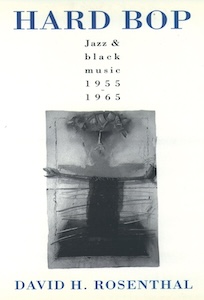
On The Bookshelf
Hard Bop: Jazz & Black Music 1955-1965
It’s nineteen fifty-something, in a dark, cramped, smoke-filled room. Everyone’s wearing black. And on-stage a tenor is blowing his heart out, a searching, jagged saxophone journey played out against a moody, walking bass and the swish of a drummer’s brushes. To a great many listeners–from Black aficionados of the period to a whole new group of fans today–this is the very embodiment of jazz. It is also quintessential hard bop.
In this, the first thorough study of the subject, jazz expert and enthusiast David H. Rosenthal vividly examines the roots, traditions, explorations and permutations, personalities and recordings of a climactic period in jazz history.
Beginning with hard bop’s origins as an amalgam of bebop and R&B, Rosenthal narrates the growth of a movement that embraced the heavy beat and bluesy phrasing of such popular artists as Horace Silver and Cannonball Adderley; the stark, astringent, tormented music of saxophonists Jackie McLean and Tina Brooks; the gentler, more lyrical contributions of trumpeter Art Farmer, pianists Hank Jones and Tommy Flanagan, composers Benny Golson and Gigi Gryce; and such consciously experimental and truly one-of-a-kind players and composers as Andrew Hill, Sonny Rollins, John Coltrane, Thelonious Monk, and Charles Mingus.
Hard bop welcomed all influences–whether Gospel, the blues, Latin rhythms, or Debussy and Ravel–into its astonishingly creative, hard-swinging orbit. Although its emphasis on expression and downright “badness” over technical virtuosity was unappreciated by critics, hard bop was the music of black neighborhoods and the last jazz movement to attract the most talented young black musicians.
Fortunately, records were there to catch it all. The years between 1955 and 1965 are unrivaled in jazz history for the number of milestones on vinyl. Miles Davis’s Kind of Blue, Charles Mingus’s Mingus Ah Um, Thelonious Monk’s Brilliant Corners, Horace Silver’s Further Explorations. Rosenthal gives a perceptive cut-by-cut analysis of these and other jazz masterpieces, supplying an essential discography as well. For knowledgeable jazz-lovers and novices alike, Hard Bop is a lively, multi-dimensional, much-needed examination of the artists, the milieus, and above all the sounds of one of America’s great musical epochs.
Hard Bop | Jazz & Black Music 1955~1965: 1992 | David H. Rosenthal
Oxford University Press
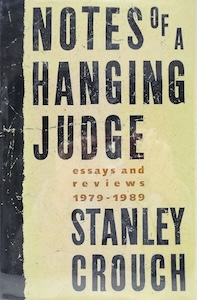
On The Bookshelf
Notes Of A Hanging Judge | Stanley Crouch
Notes Of A Hanging Judge: Essays and Reviews, 1979-1989 is a 1990 collection of essays by Stanley Crouch that critically examines the American Civil Rights Movement, Black culture, and politics, arguing the movement became “loco” and self-defeating despite its initial nobility. The book features sharp, often controversial, critiques of figures like Jesse Jackson and artists like Toni Morrison and Spike Lee, using a blend of insider passion and journalistic rigor to analyze the Black experience in America.
The title refers to Crouch’s role as a harsh judge of the Civil Rights Movement, similar to a pirate-turned-judge who was hard on his former comrades. The book includes essays on race relations, Black middle-class life, the Bernhard Goetz case, Black homosexuality, and profiles of leaders like Jesse Jackson.
Crouch views the Civil Rights Movement as a noble cause that became mired in self-defeating nationalism and a lack of spiritual depth, losing its original majesty. Written with a virtuosic prose style, it balances passionate involvement with a reporter’s rigor, offering unique perspectives on public issues. He covers a wide range of topics, from politics and social issues to art and travel, often focusing on the African-American experience.
Notes Of A Hanging Judge: 1990 | Stanley Crouch
Oxford University Press
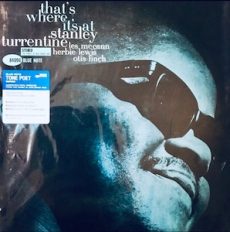
Requisites
That’s Where It’s At ~ Stanley Turrentine | By Eddie Carter
Stanley Turrentine was an exceptionally prolific tenor saxophonist who garnered numerous admirers throughout his career. He is widely recognized as a key contributor to the evolution of blues-inspired hard bop and soul jazz, as well as a trailblazer in smooth jazz. This morning’s featured album submitted for your approval is a 1962 release, That’s Where It’s At (Blue Note BLP 4096/BST 84096). This record was his second collaboration with pianist Les McCann and bassist Herbie Lewis, coming on the heels of their live performance at the Village Gate just a week prior. Drummer Otis Finch completes this dynamic quartet. The copy in my library is the 2020 Blue Note Tone Poet Series stereo reissue, which maintains the original catalog number.
The album opener, Smile, Stacey by Les McCann, begins with a brief dialogue between Stanley and Les that leads into the foursome’s theme. Stanley takes charge first, delivering a driving energy and brisk articulation. Les then swings in for the second interpretation. Herbie takes a short, sharply executed walk next, which Les finishes, then
Stanley and Les share a brief exchange with Otis before the ensemble’s soft fadeout. The quartet then cools down for Soft Pedal Blues by Stanley Turrentine, which starts with the trio’s slow-burning, soulful intro. Turrentine’s notes are placed with thoughtful precision during the melody and opening statement. McCann caresses each note of the second solo, and Turrentine delicately shapes a final comment into the theme’s restatement and slow fade.
Pia by Les McCann begins with the quartet easing into a mellow groove as the melody is introduced. Les initiates the solos with some good down-home cooking. Stanley steps in next, maintaining the calm atmosphere with a thoughtful message before the ensemble reunites for the closing chorus, which gently fades away. We’ll See Yaw’ll After While, Ya Heah by Les McCann is the pianist’s lively composition with a distinctly Southern flavor. After the quartet’s theme gets things off to a good start, Turrentine leads off the first solo, delivering each verse with precise articulation. McCann responds with a spirited interpretation that gets listeners tapping their feet and grinning along until the group’s return for the ending theme.
The tempo slows down again for Dorene, Don’t Cry, I, by Les McCann, a haunting ballad that begins with the ensemble’s beautiful melody. Stanley fully embraces the opening statement by gently attending to every note with careful lyricism and sensitivity. Les follows with something significant to say in a gorgeous performance preceding the tender reprise and close. Light Blue, by Stanley’s brother, Tommy Turrentine, brings this entertaining album to a close with a lightly swinging melody that invites listeners to sit back and enjoy the ride. McCann takes the lead with a loose, relaxed reading, then Lewis provides a few moments of pure joy. Turrentine offers the final memorable moment ahead of the group’s out chorus.
Alfred Lion produced the initial session of That’s Where It’s At, and Rudy Van Gelder was behind the dials of the recording. Joe Harley supervised the audiophile reissue, and Kevin Gray mastered the album from the original analog tapes at Cohearant Audio. The album’s sound quality is outstanding, with a stunning soundstage that transports the musicians to the sweet spot in your listening room with superb fidelity. The record was pressed on 180-gram Virgin Vinyl at RTI and is dead silent until the music begins. You’re also getting high-definition gatefold photos and superb cover packaging worthy of hanging on the wall. If you’re already a member of the Stanley Turrentine or Les McCann fan club, I highly recommend That’s Where It’s At on your next record hunt. If you aren’t already familiar with either musician, this record is an excellent introduction to their extensive discographies!
~ Les McCann Ltd. In New York (Pacific Jazz PJ-45/ST 45) – Source: Discogs.com © 2025 by Edward Thomas Carter
More Posts: choice,classic,collectible,collector,history,instrumental,jazz,music,saxophone



